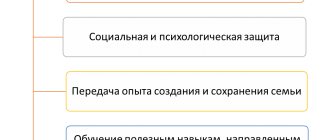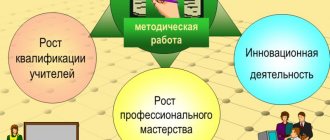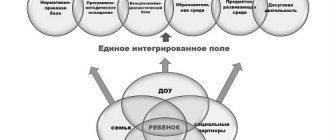Goals and objectives of methodological work
Methodological work is an important condition for improving the quality of the pedagogical process. Having gone through all forms of methodological work, organized in a certain system, educators not only improve their professional level, it becomes a need for them to learn something new, learn to do something that they do not yet know how to do. There are many definitions of the concept of “methodological work” in the literature.
K.Yu. Belaya suggests understanding: methodological work is a holistic system of activities aimed at ensuring the most effective quality of implementation of the strategic objectives of the preschool educational institution.
The task of the senior teacher of a preschool educational institution is to develop a system, to find accessible and, at the same time, effective methods of improving pedagogical skills.
The goal of methodological work in preschool educational institutions is to create optimal conditions for the continuous improvement of the level of general and pedagogical culture of participants in the educational process.
Pedagogical culture is the professional culture of a person engaged in teaching activities, the harmony of highly developed pedagogical thinking, knowledge, feelings and professional creative activity, contributing to the effective organization of the pedagogical process.
Main objectives of methodological work:
- develop a system of providing assistance to each teacher based on diagnostics and forms of work.
- include every teacher in creative search.
Particular tasks can be identified:
- Formation of an innovative orientation in the activities of the teaching staff, manifested in the systematic study, generalization and dissemination of pedagogical experience in the implementation of scientific achievements.
- Increasing the level of theoretical training of teachers.
- Organization of work on the study of new educational standards and programs.
Enrichment of the pedagogical process with new technologies, forms in the education, upbringing and development of the child.
- Organization of work on the study of regulatory documents.
- Providing scientific and methodological assistance to the teacher on the basis of an individual and differentiated approach (by experience, creative activity, education, categoricalness).
- Providing advisory assistance in organizing self-education for teachers.
The main criteria for the effectiveness of methodological work, in addition to performance indicators (level of pedagogical skill, teacher activity), are the characteristics of the methodological process itself:
- consistency - compliance of goals and objectives in the content and forms of methodological work;
- differentiation - the second criterion for the effectiveness of methodological work - presupposes a large share in the system of methodological work of individual and group lessons with educators, based on their level of professionalism, readiness for self-development and other indicators;
- stages – indicators of the effectiveness of methodological work.
The organization of high-quality methodological work in a preschool institution is ensured by a senior teacher. The quality of the educational process in a preschool educational institution depends on his professional competence, active personal position, and professional abilities. These include:
1. Analytical
Analysis:
- the state of the educational process, the implementation of the educational program;
- the level of professional competence of teachers, improvement of their qualifications, certification;
- advanced pedagogical experience;
- the latest research in the field of pedagogy and psychology;
- effectiveness of methodological work.
Organization of methodological work in a preschool educational organization
Methodological work is the main way to improve a teacher’s skills and competence.
Methodological work in preschool educational institutions is a holistic system based on the achievements of advanced pedagogical experience and on a specific analysis of the educational process. Thus, K. Yu. Belaya, Yu. A. Konarzhevsky, A. A. Orlov, P. I. Tretyakov, P. T. Frolov, T. I. Shamova and others in their studies specifically consider the relationship between the concept of “methodological work” and “training of teachers” through the identification of the subject (control subsystem) and object (managed subsystem) of methodological work in the process of organizing teacher training aimed at deepening and expanding knowledge, developing professional skills and abilities necessary for the high-quality implementation of pedagogical activities in diversified development and training children [3]. Methodological work in preschool educational institutions can be called an integral component of a unified system of continuous education of teaching staff, a system for improving their professional qualifications [1].
Methodological work should be proactive in nature and ensure the development of the entire educational process in accordance with new achievements of pedagogical and psychological science. However, today there is a problem of low efficiency of methodological work in many preschool educational institutions. The main reason is the formal implementation of the systemic approach, its replacement with an eclectic, random set of recommendations of an opportunistic nature, the implantation of far-fetched techniques and ways of organizing upbringing and education [2].
Responsibility for organizing methodological work lies with the methodologist. By defining the strategy, goals, objectives of the development and functioning of preschool educational institutions, it influences the specification of goals, objectives and the content of methodological work
The principles of organizing methodological work that contribute to the improvement of professional activity are the following: principles of relevance, unity of theory and practice; scientific principle; the principle of consistency and complexity; principles of direction, consistency, succession, continuity and mass character; the principle of creating favorable working conditions; principles of efficiency, flexibility, mobility and individual approach; the principle of continuous self-education of teachers; principle of creativity [5] .
Meanwhile, an analysis of the literature shows that scientists define the tasks of methodological work in an educational institution in different ways.
For example, Simonov V.P., identified the following tasks of methodological work:
— increasing the professional and cultural level of the teacher;
— improving methods and style of interaction with children on the principles of democratization, humanization and transparency;
— improvement of the teacher in organizing creative, research, independent work of children both in educational activities and outside of it;
- formation of skills and abilities for the teacher to analyze the educational process as a whole and self-analysis of his work;
— involving teachers in research activities based on accessible and understandable methods [7].
The most typical shortcomings in the organization of methodological work in preschool educational institutions are:
1. Unsystematicity.
2. Uniformity of organizational forms of methodological work.
3. Lack of continuity in the development of the content of methodological work.
4. Lack of a long-term planning system to improve the qualifications of teachers.
5. Formalization of the activities of the preschool organization.
6. Lack of teacher initiative and collective search for new forms of work.
Today, most teachers have a situational interest in their activities. Teachers have knowledge of the theoretical and methodological foundations of the subject educational field, are well aware of psychological and pedagogical methods of solving problems that have arisen in teaching activities, but, despite this, they have insufficiently accurate knowledge of modern requirements for a teacher and have insufficient need for self-development and self-improvement as specialists. The desire for constant replenishment of knowledge is not expressed enough. Communication skills require refinement and improvement; attention should also be paid to the development of professional and project activities. Most teachers have difficulties organizing work with parents of students.
The elimination of these shortcomings is facilitated, as practice shows, by the use of both innovative and traditional forms of individual, group and collective work with preschool teachers.
The optimal system of methodological work should be the best for a specific preschool educational organization.
When choosing a specific methodological work option for your team (content, structure, form, etc.), you must consider the following:
1) the quantitative and qualitative composition of this teaching staff;
2) the result of a diagnostic study of the personality and activities of educators, especially difficulties in their activities;
3) features of the content of methodological work (the level of development of didactic, psychological or other main directions and the connection between them);
4) comparative effectiveness of various forms of methodological work;
5) traditions, accumulated experience of methodological work (what to keep, what to abandon);
6) material, moral and psychological conditions in preschool educational institutions;
7) best practices and scientific recommendations for organizing and managing methodological work.
In order to effectively organize work at the tactical level, it is necessary to competently assess the professional competence of preschool teachers. The object of study when assessing the professional competence of preschool teachers is the process of developing the professional competence of teachers. To determine the indicators of the components of professional competence of preschool teachers, the requirements of the state educational standard for higher professional pedagogical education in the specialty “Pedagogy and methods of preschool education” should be used [4].
The diagnostic results make it possible to determine individual routes for each teacher and differentially plan work with the entire team.
The most effective forms of organizing methodological work in preschool educational institutions [6], which contribute to increasing the level of professional competence, are presented in the table
| Level of professional competence | Value-semantic component | Gnostic component | Activity component |
| High | — participation in the work of pedagogical and methodological associations of the district; | — Organization and holding of the “Educational Salon” - refresher courses; - council of teachers; | — master classes; — open demonstrations of teaching activities; — Acting as a mentor; |
| Average | — business games — social and psychological trainings | — seminars; - pedagogical advice; — consulting; - refresher courses; | — work in a creative group; - round table; |
| Short | — psychological trainings; — work in a creative group; — social and psychological trainings; | — individual and group consultations; - pedagogical advice; — consulting; - refresher courses; | — workshops; — open reviews of teaching activities; - round table; |
The task of training and development of teachers should be recognized as fundamental in the management of methodological work. At the same time, the traditional system of informing and training teachers does not always produce tangible results, since it is focused on the team as a whole. Therefore, the model for the organization and content of teacher development and the improvement of their qualifications should be built in a differentiated manner so that the internal factors and mechanisms of the teacher themselves are involved, contributing to personal, professional and moral development.
The implementation of individually oriented methodological work allows us to develop the creativity and initiative of the teaching staff by including everyone in active professional activities.
The selection of mentors for young professionals should be based on the desire of kindergarten teachers to be in this role (this can be found out by observing the teachers’ reaction to the test results and its pedagogical orientation).
“External” activities are justified as incentives to support the activity of teachers with an undeveloped position of self-development: training in courses, attending various seminars and methodological associations, getting acquainted with the work experience of other teachers, etc. The opportunity to participate in new, experimental activities (for example , working in a creative group) helps stimulate interest in the work. For teachers with an active position on self-development, a great incentive is to work on trust, the opportunity to exchange experiences with colleagues, and the offer to work in depth in one or another area of educational activity within the kindergarten.
Only a system of activities that implies an active form of training and interaction between teachers in kindergarten - workshops, trainings, consultations, conversations - can minimize such obstacles as one’s own inertia and inability to manage one’s time.
Thus, during the school year, some teachers attend all forms of work to improve professional competence, while the other part organizes creative workshops or works in a creative group.
The methodologist organizes and controls the work of teachers on self-education, related to active forms of advanced training, and helps to choose a topic, priorities in forms and means, and predict the result.
It should be remembered that the success of a preschool institution largely depends on the quality of methodological work with personnel.
Increasing the pedagogical competence of educators is a continuous process, its most important component is methodological work. Improving the methodological work itself is impossible without a correct understanding of its essence and its main purpose, the range of tasks it solves, the requirements for its organization and implementation, and without conducting at least basic research. The main thing in methodological work is to provide real, effective assistance to all members of the teaching staff .
There is no doubt that without constantly updating one’s knowledge and skills to keep up with the dynamics of social and scientific and technological progress, the work of a teacher in modern conditions is simply impossible and very difficult.
Literature:
1. Arutyunov Yu. S. Methodology for developing specific situations: Method. Recommendations. - M.: Viniti, 1980. - 44 p.
2. Bazarov T. Yu., Eremin B. L. (ed.) Personnel management. Textbook for universities. - M.: Banks and exchanges, UNITY, 1998. - 423 p.
3. Belaya K. Yu. Methodological work in preschool educational institutions. Analysis, planning, forms and methods. - M., Sphere. 2010–96s.
4. Belkin A. S. Competence. Professionalism. Mastery / A. S. Belkin. Chelyabinsk: Yuzh.-Ural. book publishing house, 2004. - 176 p.
5. Bolotov V. A., Slobodchikov V. I. et al. Design of professional pedagogical education / V. A. Bolotov, V. I. Slobodchikov et al. // Pedagogy. 1997. - No. 4. - P. 66–72.
6. Volobueva L. M. Active teaching methods in the methodological work of preschool educational institutions. // Management of preschool educational institutions. - 2006. No. 6. - p. 70 -78.
7. Simonov V.P. Diagnosis of personality and professional skill of a teacher / V.P. Simonov. M.: International. teacher Academy, 1995. -192 p.
Types of methodological work
Analysis of the psychological and pedagogical literature of scientific research allows us to identify different types of methodological work. According to the definition of S.Zh. Goncharova, “methodological activity is a specific type of educational activity, the content of which is the systemic unity of creating a method, its testing, introducing the method (obtaining methods), and applying methods.”
In the process of methodological activity, these spaces are interconnected into 3 stages of methodological activity, which are a single chain of certain elements, in which each stage has a final product: method, technique, guaranteed result.
It is possible to identify the main actions of the senior educator in each of these spaces.
When creating a search for a method of working with children: description, comparison, identification of patterns, expert opinion on significance, etc.
When introducing the method into the work of teachers: information, training, dissemination, experimental work, reproduction, etc.
When applying a methodology or method, the main emphasis is on control over the implementation of the main provisions and correction of this methodology.
Methodological office-center for methodological work in preschool educational institutions.
The center of all methodological work of the preschool educational institution is the methodological office. He plays a leading role in assisting teachers in organizing the educational process, ensuring their continuous professional self-development, generalizing best practices, and increasing the competence of parents in matters of raising and educating children.
The methodological classroom of a preschool institution meets such requirements as information content, accessibility, aesthetics, ensuring motivation and activity in development, and content. The implementation of the information and analytical function of managing a preschool institution determines the formation of an information data bank in the methodological room, where sources and content are determined.
All manuals and materials of the method room are intended for differentiated assistance to educators in their work with children to improve the qualifications of teaching staff, as well as to collect, study and generalize the best work experience.
In the methodological office of the preschool educational institution, exhibitions are regularly organized: ongoing and occasional. Permanent exhibitions are, for example, the following: “New Literature,” “Introduce children to nature (by season),” “To help the teacher,” and others. Only the title of the section is constant, but the material and content change.
The topics of exhibitions are very diverse, but when designing them, some recommendations are followed:
If there is a regulatory or instructional document on this topic (regulations, instructions, etc.), then a plan for its study, recommendations for teachers on working with it, experience of working with this document from other preschool educational institutions, etc. are presented.
Methodological recommendations on this topic.
Work experience related to this topic.
Literature on this topic.
Visual material related to this issue: list of equipment, diagrams, drawings, samples of crafts, paintings, slides, videos, etc.
In addition, the methodological room presents new material from various sources, attracting the attention of teachers to the problems of education and training, helping to prepare for competitions, informing about events and changes in preschool education, making them think about pedagogical situations, and reflect on their work.




